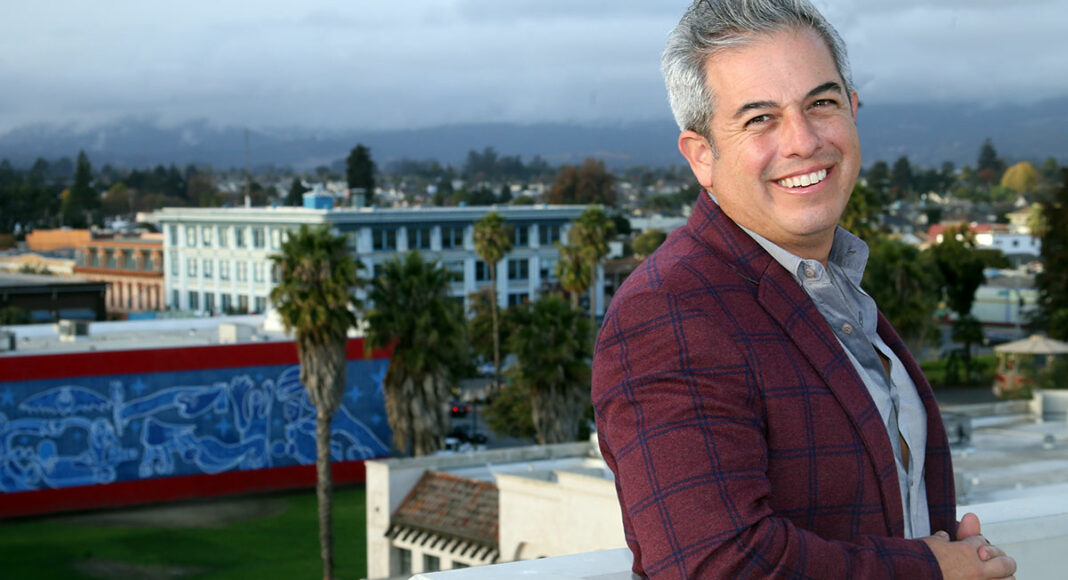The 2020 U.S. Election saw a record turnout, with a higher percentage of Americans voting than in any election in at least a century. With that high number of voters came plenty of landmark wins—including for LGBTQ candidates in all levels of government.
LGBTQ representation in Congress will hit an all-time high in 2021, and a record-breaking number of candidates have been elected to state legislatures. In Delaware, Sarah McBride became the first transgender person elected to any state senate in the U.S. In Florida, Shevrin Jones became his state’s first LGBTQ senator.
Local candidates also secured historic wins this year. Jimmy Dutra, who served on the Watsonville City Council from 2014 to 2018, will be the city’s first openly gay mayor after winning the race for his District 6 seat.
In Santa Cruz, Vice Mayor Donna Meyers, who was elected to the City Council in 2018, is the presumptive choice to serve as the city’s next mayor. The Santa Cruz City Council won’t vote to appoint the next mayor until December, but assuming it all goes as expected, Meyers would become the city’s first-ever lesbian mayor.
Dutra says he’s “thrilled” that the mayors of the two largest cities in the county will be LGBTQ.
“It is definitely a moment in history that will be archived and remembered,” he says. “But it’s more than that. It’s hope for our future leaders …. It will give them hope that anything is possible, no matter who you are or who you love.”
In addition to Dutra and Meyers, there were other LGBTQ candidates who won local races. Steve Trujillo won a seat on the Cabrillo College Board of Trustees. Nancy de la Peña is now the first LGBTQ judge elected to the Santa Cruz County Superior Court.
Meyers is “very excited” about the progress nationwide toward getting more kinds of representation in office.
“Communities are made up of diversity,” Meyers says. “It is so important to have all perspectives … to identify the needs of everyone.”
TRUE TRAILBLAZER
When it comes to LGBTQ representation, Dutra and Meyers credit the career of current California State Senator-elect John Laird with leading the way.
Santa Cruz city voters first elected Laird to the City Council all the way back in 1981. Laird says he didn’t hide the fact that he was gay, but many residents didn’t know. In November 1983, shortly before his fellow councilmembers appointed him mayor, a reporter asked Laird if he was gay. He confirmed that he was. Pretty soon, the news was all over newspapers across Santa Cruz County and beyond. TV news crews from across the state showed up for Laird’s swearing-in. At the time, there were only a few LGBTQ elected officials anywhere in the U.S. That year, he and two others became the three first openly gay mayors in the country.
Laird says he didn’t know how the news would go over. Looking back now, he is glad he was so open about who he is.
“My job was to be the best mayor I could … but to be clear about who I was,” he says. “Whatever credibility I gained I’d spend on making clear that it’s a good thing to be LGBT. It changed people’s views. That was my goal.”
Laird went on to become one of the first two openly gay men to serve in the California legislature, with the other being then-Assemblymember Mark Leno of San Francisco. Laird also helped form the first LGBTQ caucus and served eight years as California’s secretary for natural resources.
Meyers says that Laird’s legacy has been “instrumental” in paving the way for progress.
“This community has always been supportive, and now we also have the ability to be on the frontline of policy,” she says.
Much of that local support has come from organizations like the Diversity Center Santa Cruz County, which has been advocating for LGBTQ rights since 1989. Local historian Rob Darrow says the center has remained a safe space for people to discuss their political aspirations.
“What we are seeing today [is] the result of the longstanding programs and spaces provided in the past,” he says.
LOOKING AHEAD
Santa Cruz County has been a progressive region for LGBTQ rights for decades. In the 1970s, Santa Cruz adopted anti-discrimination ordinances and was the third city in California to organize a Pride event. In 1978, the county helped stop the Briggs Initiative, which proposed to outlaw gay or lesbian teachers in public schools.
The results of the 2020 election may be a culmination of all that history and progress. Still, Dutra says, everyone has a long way to go.
“It’s an exciting moment, but it does give me pause. Why did it take so long?” he asks, noting that he and Meyers will be only the first and second LGBTQ mayors elected in the county since Laird left office. “It’s been nearly 40 years.”
It was not until 2008 that Watsonville had its first Pride event. The Pajaro Valley Pride organization was formed in 2016, aiming to transform the somewhat socially conservative area into a more accepting place for LGBTQ residents.
Having representation in office, Dutra says, is crucial to the city’s future. There’s immense value, he explains, in constituents being able to see themselves reflected in their elected officials, no matter their race, religion or sexual orientation.
For his part, Dutra is focused on returning to elected office. He says he’s extremely thankful to the community and eager to serve his hometown.
“I’m overwhelmed by the support I received,” he says. “I promise to work for all of us—no matter who you are.”
Additional reporting by Jacob Pierce.














